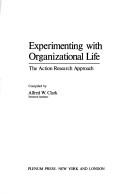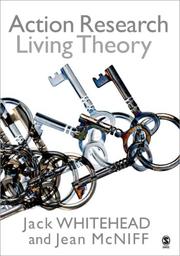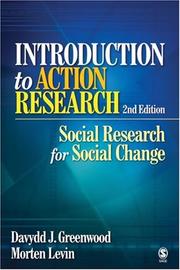| Listing 1 - 10 of 511 | << page >> |
Sort by
|

ISBN: 0306308797 Year: 1976 Publisher: New York (N.Y.) : Plenum press,
Abstract | Keywords | Export | Availability | Bookmark
 Loading...
Loading...Choose an application
- Reference Manager
- EndNote
- RefWorks (Direct export to RefWorks)

ISBN: 9781412908559 9781412908542 9781847874641 9786611019945 9781446240304 1849208530 1847874649 1281019941 Year: 2006 Publisher: London ; Thousand Oaks : SAGE Publications,
Abstract | Keywords | Export | Availability | Bookmark
 Loading...
Loading...Choose an application
- Reference Manager
- EndNote
- RefWorks (Direct export to RefWorks)
This book is about the practice and theory of action research. It is written for practitioner action researchers who are committed to improving their learning, and offering explanations for how and why they are doing so. Specifically it is written for those on formal accredited courses and their lecturers, and also for those at a more advanced stage of their workplace enquiries, who wish to engage with ideas about the practicalities of doing action research, and about its theoretical underpinnings.
Film
ISBN: 9781473972421 Year: 2017 Publisher: London, United Kingdom : SAGE Publications Ltd.,
Abstract | Keywords | Export | Availability | Bookmark
 Loading...
Loading...Choose an application
- Reference Manager
- EndNote
- RefWorks (Direct export to RefWorks)
David Coghlan defines insider action research as conducting a study within one's own organization or community with the goal of making positive change. He identifies issues with self-diagnosis and relates his own experiences with the method.
Book
ISBN: 9004424857 Year: 2020 Publisher: Leiden, The Netherlands ; Boston : Brill Sense,
Abstract | Keywords | Export | Availability | Bookmark
 Loading...
Loading...Choose an application
- Reference Manager
- EndNote
- RefWorks (Direct export to RefWorks)
Many community health interventions fail, wasting tax dollars and human resources. These interventions are typically designed by subject matter experts who don’t have direct experience with the local community. In contrast, successful interventions are built from the ground up, planned and implemented by the people that will benefit from them, using community-based action research. Researching With: A Decolonizing Approach to Community-Based Action Research is a guide for how to do research that is inclusive, engages in community-building, and implements a decolonizing framework. This text advocates for a collaborative approach, researching with communities, rather than conducting research on them. Reviewing both theory and method, Jessica Smartt Gullion and Abigail Tilton offer practical tips for forming community partnerships and building coalitions. Researching With also includes helpful information about incorporating community work into a successful academic career. This book can be used as supplemental or primary reading in courses in sociology, social work, health research, nursing, public health, qualitative inquiry, and research methods, and is also of value to individual researchers and graduate students writing their thesis.
Film
ISBN: 9781473964495 Year: 2017 Publisher: London, United Kingdom : SAGE Publications Ltd.,
Abstract | Keywords | Export | Availability | Bookmark
 Loading...
Loading...Choose an application
- Reference Manager
- EndNote
- RefWorks (Direct export to RefWorks)
Dr. Nataliya Ivankova defines action research as using systematic research principles to address an issue in everyday life. She delineates the six steps of action research, and illustrates the concept using an anti-diabetes project in an urban area.
Book
ISBN: 0228002370 0228002362 Year: 2020 Publisher: Montreal : McGill-Queen's University Press,
Abstract | Keywords | Export | Availability | Bookmark
 Loading...
Loading...Choose an application
- Reference Manager
- EndNote
- RefWorks (Direct export to RefWorks)
While the action research community across Canada is a vibrant one, it remains scattered, dismissed as rootless and still unproven. This book illuminates action research as a vital and long-established Canadian perspective, taking stock of its use in education by a wide array of scholars and practitioners. Reflecting an inclusive range of viewpoints from twenty-two scholars across the nation, chapters show without question that action research - encompassing collaborative, iterative, and practice-based research - is a growing field in Canada. Authors bring a range of experiences that speak to the many facets of this movement. They discuss historical foundations, individual and large-scale projects dealing with a multitude of subject areas and educational practices, and participatory methods that speak to the discipline's capacity to engage with the pressing social issues of our time. A timely intervention that threads the field together and serves as both a reference and a guide to further work, The Future of Action Research in Education draws clear links between the past and future and maps bold new directions for this approach.
Film
ISBN: 9781473989726 Year: 2017 Publisher: London, United Kingdom : SAGE Publications Ltd,
Abstract | Keywords | Export | Availability | Bookmark
 Loading...
Loading...Choose an application
- Reference Manager
- EndNote
- RefWorks (Direct export to RefWorks)
Professor David Coghlan explains action research as an approach that crosses many academic disciplines yet has a shared focus on taking action to address a problem. He describes the difference between this approach and empirical scientific approaches, particularly highlighting the challenge of getting action research to be taken seriously by academic journals.

ISBN: 1412925975 9781412925976 Year: 2007 Publisher: Thousand Oaks Sage
Abstract | Keywords | Export | Availability | Bookmark
 Loading...
Loading...Choose an application
- Reference Manager
- EndNote
- RefWorks (Direct export to RefWorks)
Film
ISBN: 9781473985063 Year: 2017 Publisher: London, United Kingdom : SAGE Publications,
Abstract | Keywords | Export | Availability | Bookmark
 Loading...
Loading...Choose an application
- Reference Manager
- EndNote
- RefWorks (Direct export to RefWorks)
Professor Jean McNiff talks about action research, the responsibility innate to knowledge, and the emerging nature of reality. She highlights key thinkers in the area of emergence and growth. She also discusses issues of empowerment, regarding both students and researched communities.
Book
Year: 1973 Publisher: Louvain Institut des sciences politiques et sociales
Abstract | Keywords | Export | Availability | Bookmark
 Loading...
Loading...Choose an application
- Reference Manager
- EndNote
- RefWorks (Direct export to RefWorks)
| Listing 1 - 10 of 511 | << page >> |
Sort by
|

 Search
Search Feedback
Feedback About UniCat
About UniCat  Help
Help News
News